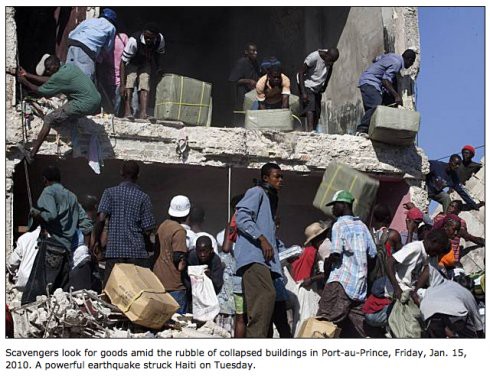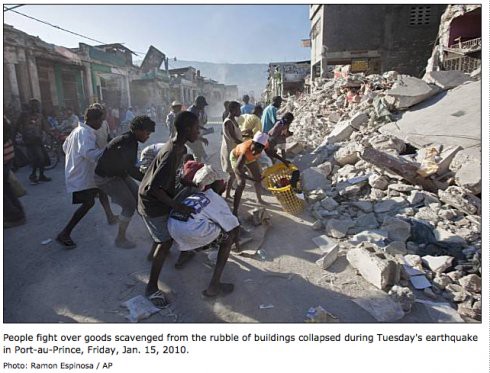Looting Overtakes the Media

“Looters,” reported the Wall Street Journal yesterday from Port-au-Prince, “were scaling a crumpled building, apparently a grocery store, and throwing items to the assembled throng below.” That “looting” is traditionally construed to mean illegally obtaining goods for one’s own benefit-not for the benefit of a waiting crowd of the recently homeless-seems to have entirely escaped these reporters. The Journal, while chronicling this “violence” against property, does, however, offer one dissenting viewpoint: “Standing at the edge of the mob, 18-year-old Reginald Elacen suggested the police should be allowing the badly damaged stores to be emptied, and helping keep order. ‘We really don’t have a choice,’ he said, referring to the desperate needs of Haitians who lost everything in the quake. ‘If the police would help, it could be done without violence.’” What a wild idea. And? “Still, just a few blocks away on the road, a store owner was calmly overseeing an orderly emptying of his broken shop. He was using a kind of bucket-brigade of some 30 young men stretching over the store’s shattered roof, handing out goods can by can.” This article, incidentally, is headlined “Haiti Authorities Battle Looters.”
We turned to the Sunday edition of our Paper of Record as well, for desperately needed context and clarity. Sorting through the chaos and ruins of post-earthquake Haiti, the New York Times fronted an impressionistic dispatch reassuring its privileged readership that, yes, at long last, looting was truly under way on the streets of Port-au-Prince.
Throughout the past week, of course, the U.S. media has seized upon any faint hearsay inkling of post-disaster mayhem in the Caribbean nation with the unseemly gusto that Sandy Dennis showcased as she hooted for “More violence!” in Who’s Afraid of Virginia Woolf? And Times correspondents Simon Romero and Marc Lacey joined the chorus, after a rushed disclaimer to the effect that, what with the overarching “desperation, the lack of food and water as well as the absence of law and order” in the poorest nation in the Western hemisphere, “it was all the more remarkable that a spirit of cooperation and fortitude prevailed nearly everywhere else” outside the capital city.
And with that out of the way-on to the bloodsport! Here, for instance, is a group of Haitian police officers dispersing a crowd of looters on the Boulevard Dessalines, many of whom “wore bandanas over their faces, shielding their identities from the policemen and their noses from the smell of rotting corpses.” Nearby, Romero and Lacey, or their stringers, happened upon a man outside a general store who “emerged wild-eyed with a pair of shoes still in their box,” who announced-”with a smile,” mind you-that “there is good pillaging here.” They also goose up the mood of general alarm by noting this footwear-themed fiendishness occurred “a few blocks away from the Civil Prison, which had collapsed in the quake, freeing all the inmates who were not killed.” “No one could answer,” they disclaim with near-palpable regret, whether a marauding group of machete-wielding looters “were among the dozens who escaped” the facility (because of course in any quake recovery effort, the first thing you do is issue machetes to newly liberated inmates).
But no matter; a digressive speculation is all that’s needed to plant the seed of social panic.
That, and quotes from understandably jumpy survivors and aid workers. One anonymous World Food official actually notes that “for the moment, the population is rather quiet,” but-wait for it-”we are seeing the first signs of violence and looting.” The dispatch alights, confusingly enough, on a vigilante mob besetting a looter detained by police, stripping and battering him and finally setting him on fire-a heinous outbreak of violence, to be sure, but one that doesn’t clearly bespeak an unruly contempt for property in the wake of a devastating natural disaster. And even the looting outbreaks the Times duo can confirm point up something shy of insatiable bling-lust; outside Port-au-Prince stores and warehouses, they note, crowds fought over “rolls of fabric, saucepans, and other items,” bespeaking either the widespread desperation of an already poor population looking to meet basic needs as international aid starts to trickle in, or else a cohort of street gangs and violent escaped prisoners with a most inapposite Martha Stewart fixation.
It is, of course, an article of faith in Timesland, and the mediasphere at large, that reckless disturbance of the social peace is the role scripted for poor people in the wake of a disaster-especially those who happen to be darker complexioned, and thereby conveniently saddled with all the coded insinuations that typically accompany “culture of poverty” arguments.
In an exceptionally cloddish column on Thursday, Times opinion hand David Brooks rushed to just such an argument. He maintained that regardless of any aid efforts, Haiti will remain mired in destructive want, thanks to “a complex web of progress-resistant cultural influences. There is the influence of the voodoo religion, which spreads the message that life is capricious and planning futile. There are high levels of social mistrust. Responsibility is often not internalized. Child-rearing practices often involve neglect in the early years and harsh retribution when kids hit 9 or 10.”
There is also, of course, a couple of centuries worth of deliberate economic isolation, fomented chiefly by the diplomatic seers in these United States, who for all sorts of embarrassing reasons did not want the Western hemisphere’s second major republic to be founded and led by former slaves. There’s also a history of brutal recourse to political violence to shore up the rule of unpopular authoritarian regimes in the island nation-furnishing in the process additional rationales for US interventions that have rarely erred on the side of an expanded Haitian democracy. Those are just a couple among scores of reasons that the culture-first maunderings of the Brooks crowd-who at the end of the day are little more than less forthright and better credentialed Pat Robertsons-can’t withstand more than a moment’s critical scrutiny.
You’d like to think that the armada of American correspondents now on the ground in Port-au-Prince could be more mindful of such enormous Monroe-Doctrine blindspots as they file their breathless “Is-it-violent-yet?” dispatches. But that all looks like drearily wonky fare, I guess, next to the Mad-Lib style insinuation that a machete-swinging marauder might possibly be an escaped convict.
And the actual social conditions of Haiti over the last century or so can’t compare with the goggle-eyed observation-collected inside the Times’ A section by the same Lacy and Romero team-that the earthquake amazingly enough, afforded no special protection to the thin stratum of Haiti’s wealthy folk. “Earthquakes do not respect social customs,” they announced in the sort of reporterly dumbfoundment that has long been the Times’ calling card on matters of social class. “They do not coddle the rich.”
Digging deeper, they marvel that “the unsettling feeling of seeing one’s home collapse, no matter the size, affected Haitians of all social strata…. Destruction… was on display up and down exclusive residential areas like Pacot, near the old center, and Pétionville, in the hills above the city. Mansions were flattened and monied families slept in the street in front of their destroyed residences, clinging to their possessions.”
That’s right. The devastating Lisbon earthquake of 1755 prompted a widespread spiritual crisis among the philosophes of Europe, causing them to question how such random devastation could be squared with the existence of a compassionate personal God; our own makers of respectable opinion are shaken to their existential core, evidently, by the reflection that there are some calamities that can even extend to mansions and monied families.
Curiously enough, Lacy and Romero are able to buttonhole one departing Haitian businessman named Harold Marzouka on the dread specter of popular looting. Marzouka, who owns a spaghetti factory in Port-au-Prince, was about to board a charter flight to Miami, so is clearly none too sanguine about short-term prospects for social peace. But unlike the ideal-type Times reader, he’s pretty unexcited about the prospect of damage to his own property. Telling our correspondents that he fully expects one of his food warehouses to be looted in the days ahead, he says, “I understand it and I don’t mind.”
It would be useful to know whether that outlook sprang from a weary fatalism about Haiti’s socioeconomic plight, or a simple recognition that people without any other resources tend to do what they need to in order to keep eating. We’ll never know, though-the guy, after all, was dealing with a media culture where responsibility is not often internalized.

Chris Lehmann is currently out of the house, looting some free Wifi.
